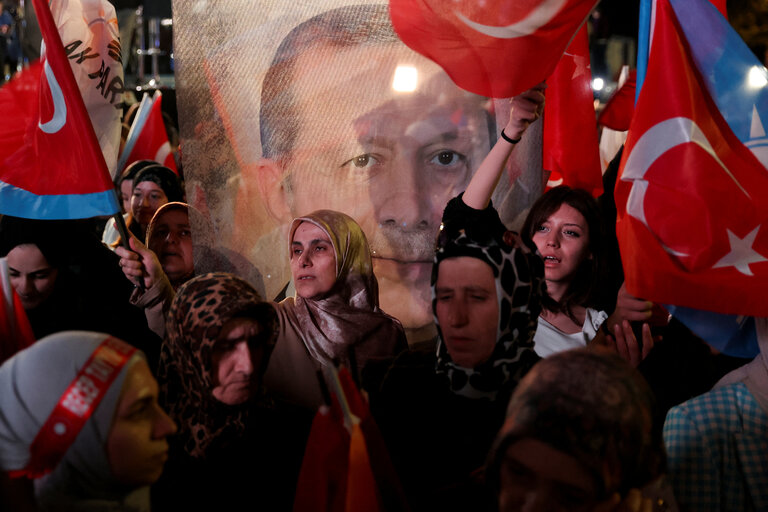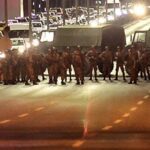The upcoming municipal election in Turkey on 31 March is more than a simple municipal election. This is evident by the intense campaigning led by Ministers and even by the President Erdoğan himself, specifically for the candidate of the Justice and Development Party (AKP or Adalet ve Kalkınma Partisi) for the Istanbul mayorship. The two biggest cities in Turkey, Istanbul and Ankara, have been ruled by the mayors of Republican People’s Party (CHP or Cumhuriyet Halk Partisi), the opposition party that was founded by Mustafa Kemal Atatürk, since the last municipal elections in 2019. Erdoğan’s and the Ministers’ relentless propaganda and campaign suggest that ‘winning back’ Istanbul and Ankara is of vital importance for AKP. Why is this the case? Why would municipal elections matter this much for the President, who is also the leader of the AKP?
First of all, AKP mayor candidates getting elected in Istanbul and Ankara would have symbolic significance for Erdoğan to re-consolidate his power. In the presidential elections of last year, Erdoğan received 49.50 percent of the votes nation-wide in the second round, yet in both Istanbul and Ankara, he lost to his opponent Kılıçdaroğlu. This year, throughout the election campaign, AKP candidates for Istanbul and Ankara, Murat Kurum and Turgut Altınok respectively, have performed less-than-spectacular, whereas their charismatic opponents Ekrem İmamoğlu, the incumbent mayor of Istanbul, and Mansur Yavaş, the incumbent mayor of Ankara, had already gained the public’s trust with their performances for the last five years. If AKP manages to win these two cities with their relatively low-profile candidates, then it would mainly be due to Erdoğan’s following in these cities, and it would be a major psychological boost for him. Istanbul is also where Erdoğan was born and grew up, and Erdoğan’s first breakthrough in Turkish politics came in 1994, when he himself was elected as the mayor of Istanbul. Istanbul also represents ‘the capital city’ in Erdoğan’s visionary neo-Ottoman empire, an empire he has built during the 22 years of his power as an opposition to the Kemalist Republic of Turkey.
Secondly, having control over municipalities, especially the ones with bigger budgets such as Ankara and Istanbul, means more opportunities for AKP to assign the municipality projects to ‘their people’. AKP has constructed a “yerli ve milli” (an AKP-constructed term that literally means ‘local and national’ yet refers to those who are loyal to AKP and to Erdoğan) empire that is exclusive to their loyal followers, which means that anyone (even if they are practising Sunni Muslims) who openly opposes AKP or Erdoğan is excluded from the system. This also extends to all the public servants and to anyone else who works at a public institution. This empire was built on the premise that anyone within the empire would be financially secured, and everyone else outside the empire would be excluded from the privileges that comes with being a subject of the empire. This also means that citizens who vote for anything other than AKP would not receive equal treatment. In fact, this implication was confirmed by Erdoğan himself a couple of weeks ago in his speech with regards to municipal elections: he explicitly stated that “if there are no votes, there would be no services available”, and emphasised the importance of the congruence between the government and the municipalities. This confession of sabotaging the services of non-AKP municipalities came as no surprise to most people who have been following Erdoğan for years, yet it was still a bold statement. Whether it is an effective method to impress the voters remains to be seen.
So, the question of why municipal elections are so crucial in Erdoğan’s empire can be explained by Erdoğan’s desperate need to preserve and to expand the borders of his empire. When the daily intricacies are intertwined with the macro politics of the government, the survival of the said-empire depends on micromanaging every little detail of its subjects and on controlling who exits and enters the empire. Thus, everyone ‘outside’ their borders becomes a ‘terrorist’ who threatens their existence; anyone who does not vote for them is not welcome in their empire, and the scarce resources on these lands (there is literal scarcity after years of destruction of the agriculture) are exclusively reserved for those who is willing to be a subject in Erdoğan’s empire. This year’s municipal elections will be a manifestation of which cities will be included into or excluded from the empire.
——————————————————————————————————————————————————————————————————-
Exclusively written for NAT (News About Turkey) by: Dr. Ceren Şengül
Dr. Ceren Şengül is one of the managing editors for the journal Studies in Ethnicity and Nationalism. She graduated with a Ph.D. in Sociology from the University of Edinburgh in 2016. She has published many articles, and her first book, Customized Forms of Kurdishness in Turkey: State Rhetoric, Locality, and Language Use, based on her Ph.D. thesis, was published by Lexington Books in 2018. She has also taught and convened various modules in Sociology at all undergraduate levels at the University of Edinburgh and Istanbul Okan University. Follow her on X: @csengul86
News about Turkey offers readers different points of view. The opinion expressed in this text is not necessarily shared by NAT.



